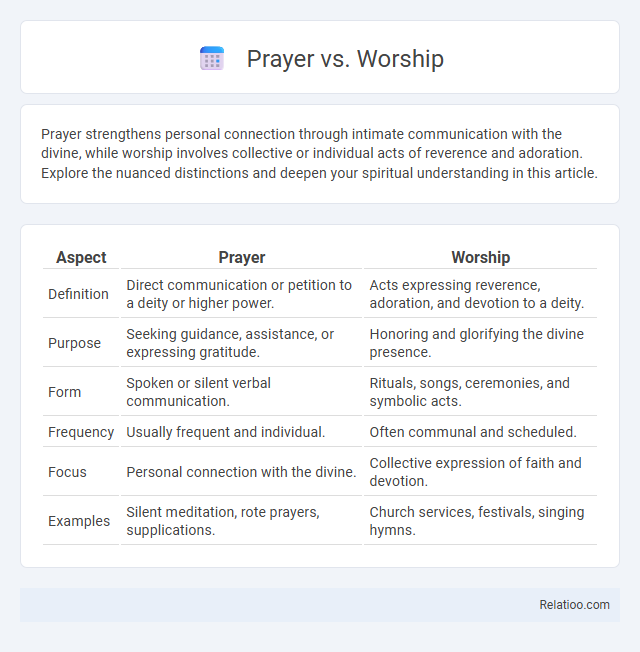Prayer strengthens personal connection through intimate communication with the divine, while worship involves collective or individual acts of reverence and adoration. Explore the nuanced distinctions and deepen your spiritual understanding in this article.
Table of Comparison
| Aspect | Prayer | Worship |
|---|---|---|
| Definition | Direct communication or petition to a deity or higher power. | Acts expressing reverence, adoration, and devotion to a deity. |
| Purpose | Seeking guidance, assistance, or expressing gratitude. | Honoring and glorifying the divine presence. |
| Form | Spoken or silent verbal communication. | Rituals, songs, ceremonies, and symbolic acts. |
| Frequency | Usually frequent and individual. | Often communal and scheduled. |
| Focus | Personal connection with the divine. | Collective expression of faith and devotion. |
| Examples | Silent meditation, rote prayers, supplications. | Church services, festivals, singing hymns. |
Understanding Prayer: Definition and Purpose
Prayer is a spiritual communication directed towards a divine entity, aimed at expressing need, gratitude, or seeking guidance. It serves as a personal dialogue that fosters connection, reflection, and inner peace. Unlike worship, which emphasizes reverence and adoration, prayer focuses on intentional interaction and emotional expression with the sacred.
Exploring Worship: Meaning and Significance
Worship encompasses a broad expression of reverence and adoration directed toward a deity, going beyond the act of prayer, which primarily involves communication or petition. It includes rituals, praise, devotion, and acts of surrender that cultivate a deep spiritual connection and reflect the believer's commitment and love. The significance of worship lies in its ability to foster communal unity, personal transformation, and an enduring relationship with the divine.
Key Differences Between Prayer and Worship
Prayer is a personal communication with a deity, often involving requests, praise, or confession, while worship encompasses broader acts of reverence and adoration, including rituals, singing, and communal gatherings. Prayer usually involves specific verbal expressions or meditations directed to a divine presence, whereas worship includes a holistic lifestyle of devotion and submission. Understanding the distinction clarifies that prayer is a component of worship, but worship represents a larger spectrum of spiritual engagement and expression.
The Role of Prayer in Spiritual Life
Prayer serves as a direct communication channel between You and the divine, enabling personal connection, reflection, and spiritual growth. Worship encompasses broader expressions of reverence, including rituals, music, and communal gatherings that honor a higher power. While all are integral to spiritual life, prayer uniquely fosters intimacy and guidance in Your ongoing spiritual journey.
The Importance of Worship in Religion
Worship holds a central role in religion as it fosters a deep connection between Your soul and the divine, creating a sacred space for spiritual growth and reflection. Unlike prayer, which is often a personal communication or petition to a higher power, worship encompasses the collective expression of reverence, adoration, and devotion through rituals, hymns, and ceremonies. This profound act of worship strengthens community bonds and reinforces the core beliefs and values that guide religious life.
Types of Prayer: Personal, Intercessory, and Communal
Prayer encompasses various forms, including personal prayer, which involves direct communication with the divine to express individual needs and gratitude; intercessory prayer, where you pray on behalf of others seeking spiritual support or intervention; and communal prayer, performed within a group setting to foster shared faith and collective worship. Worship often integrates these prayer types but extends to include rituals, songs, and reverence that honor the divine presence. Understanding these distinctions enhances your spiritual practice by clarifying when to engage in personal reflection versus advocating for others or participating in community faith expressions.
Forms of Worship: Rituals, Music, and Sacraments
Forms of worship encompass rituals, music, and sacraments, each playing a distinct role in spiritual expression and community participation. Rituals involve structured actions such as prayer, meditation, and ceremonies that connect individuals to the divine, while music enhances worship through hymns, chants, or instrumental melodies that evoke emotional and spiritual resonance. Sacraments, such as baptism and communion, serve as sacred rites that symbolize and confer spiritual grace within various religious traditions.
Prayer Across Different Religions
Prayer serves as a foundational practice in many religions, including Christianity, Islam, Hinduism, and Buddhism, where it acts as a direct communication with the divine or spiritual entities. Worship encompasses a broader spectrum of activities, such as rituals, singing, and offerings, designed to honor and revere the sacred, while prayer is often a personal and verbal exchange. Your engagement in prayer connects you to diverse spiritual traditions, reflecting unique cultural expressions and intentions across different faiths.
Worship Practices in Various Faith Traditions
Worship practices in various faith traditions encompass rituals, prayers, music, and symbolic acts that express reverence and devotion to the divine. Unlike prayer, which is often a direct communication or petition to a higher power, worship involves a broader range of activities including communal gatherings, sacred ceremonies, and prescribed liturgies that create a shared spiritual experience. Your understanding of these practices can deepen by exploring diverse traditions such as Christian liturgical services, Hindu puja rituals, and Islamic Salah, each reflecting unique cultural and theological dimensions.
Integrating Prayer and Worship for Spiritual Growth
Integrating prayer and worship creates a powerful pathway for your spiritual growth by deepening your connection with the divine. Prayer acts as a direct communication channel, while worship encompasses reverence and praise, enriching the spiritual experience through heartfelt expression. Combining these practices nurtures a balanced relationship with God, fostering inner peace and spiritual maturity.

Infographic: Prayer vs Worship
 relatioo.com
relatioo.com